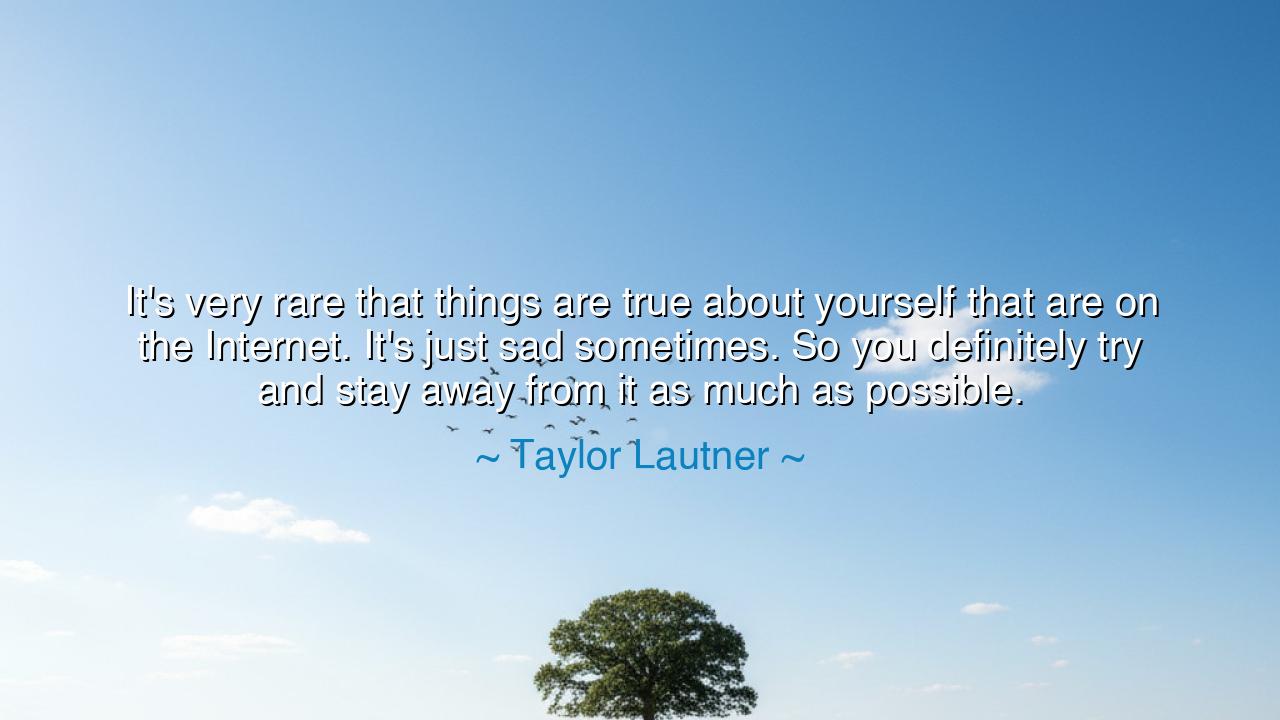
It's very rare that things are true about yourself that are on
It's very rare that things are true about yourself that are on the Internet. It's just sad sometimes. So you definitely try and stay away from it as much as possible.






The words of Taylor Lautner resound with both sorrow and warning: “It’s very rare that things are true about yourself that are on the Internet. It’s just sad sometimes. So you definitely try and stay away from it as much as possible.” In this reflection, he speaks to the dissonance between reality and illusion, between the life we live and the distorted reflection cast upon the screens of the world. He reminds us that the Internet, though vast in power, is not always the keeper of truth but often a mirror warped by rumor, envy, and misunderstanding.
The origin of these words lies in Lautner’s own experience as a figure in the glare of fame. Rising young into the world of celebrity, he became a subject of fascination, and the digital world spun countless tales about him—tales that did not reflect his true self. His lament is not unique, but part of a chorus of those who have found themselves misunderstood, their names chained to stories they did not write. In his sadness, there is also wisdom: the wisdom to withdraw from the toxic gaze of falsehood, to guard one’s soul from the constant barrage of untruths.
The ancients, though they had no Internet, knew well the dangers of rumor. In Rome, whispering tongues were as powerful as swords, and reputations could be destroyed in the Senate before truth had time to awaken. Julius Caesar himself once said that it is easier to find men willing to die than men willing to resist gossip. The same principle applies in our age—the network of voices may be faster, wider, louder, but the essence is the same: men and women are too quick to believe what they hear, too slow to search for the truth.
History offers us the example of Joan of Arc. She, too, was bound in the chains of falsehood. Though she led armies and inspired a nation, her enemies spread lies to blacken her name. She was accused of heresy and witchcraft, not because truth demanded it, but because power desired it. The record of her trial shows how voices conspired to bury her under falsehoods, much like the cruel flood of digital rumors that bury reputations today. Yet, centuries later, truth rose, and she was vindicated as a saint. Her story echoes Lautner’s warning: the judgment of the crowd is fickle, and the truth often lies elsewhere.
The deeper meaning of this quote is not simply about the Internet or about fame—it is about the human soul’s need for discernment. The world has always offered false images of others, but now those images multiply with terrifying speed. To believe them blindly is folly; to be consumed by them is despair. Thus, Lautner teaches that sometimes the wisest act is to turn away, to stay away from it as much as possible, preserving peace of mind against the onslaught of distortion.
The lesson for us is plain: do not seek yourself in the eyes of the crowd, nor in the shifting words of strangers. Know yourself in silence, in honesty, in the circle of those who truly know you. When others speak falsely, remember that their words cannot change your essence. And when you are tempted to believe rumors about others, pause, reflect, and ask: is this truth, or only a shadow? By this practice, you will guard not only your own soul but also the dignity of others.
Practical action lies before us: limit your gaze into the digital mirror, and do not let the Internet become the measure of your worth. Choose carefully where you seek truth, and surround yourself with voices of trust, not noise. If lies are spoken about you, do not be consumed by them, but let your life speak louder than rumor. And if you witness falsehood about another, resist the temptation to spread it further. In doing so, you rise above the tide of distortion and live as one anchored in truth.
So let us remember Lautner’s wisdom: what is said about you on the Internet is rarely true, and to chase those shadows is sorrow. Instead, look within, live authentically, and let the truth of your deeds shine brighter than the lies of the crowd. For in the end, truth is like the sun—it may be hidden by clouds for a time, but it cannot be extinguished, and one day it will shine forth again.






AAdministratorAdministrator
Welcome, honored guests. Please leave a comment, we will respond soon